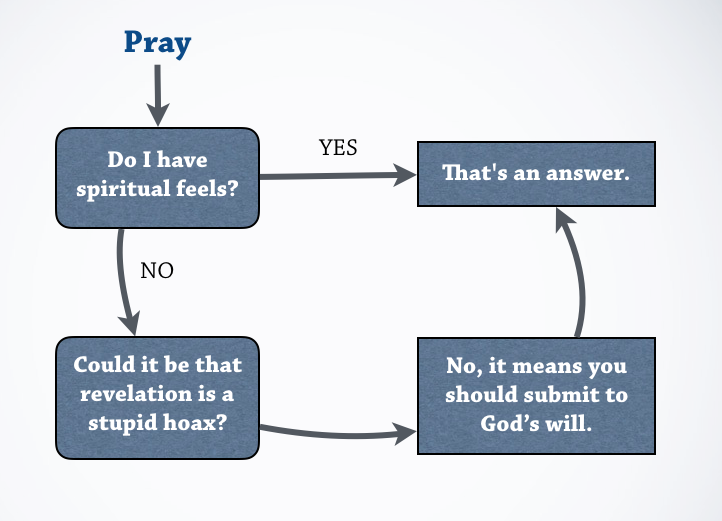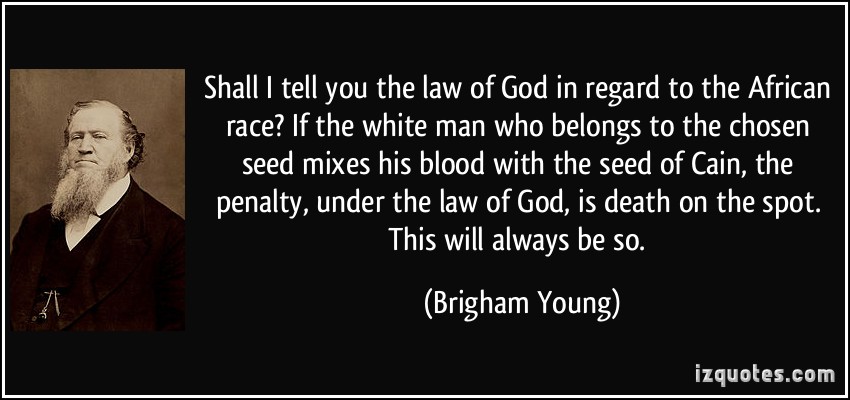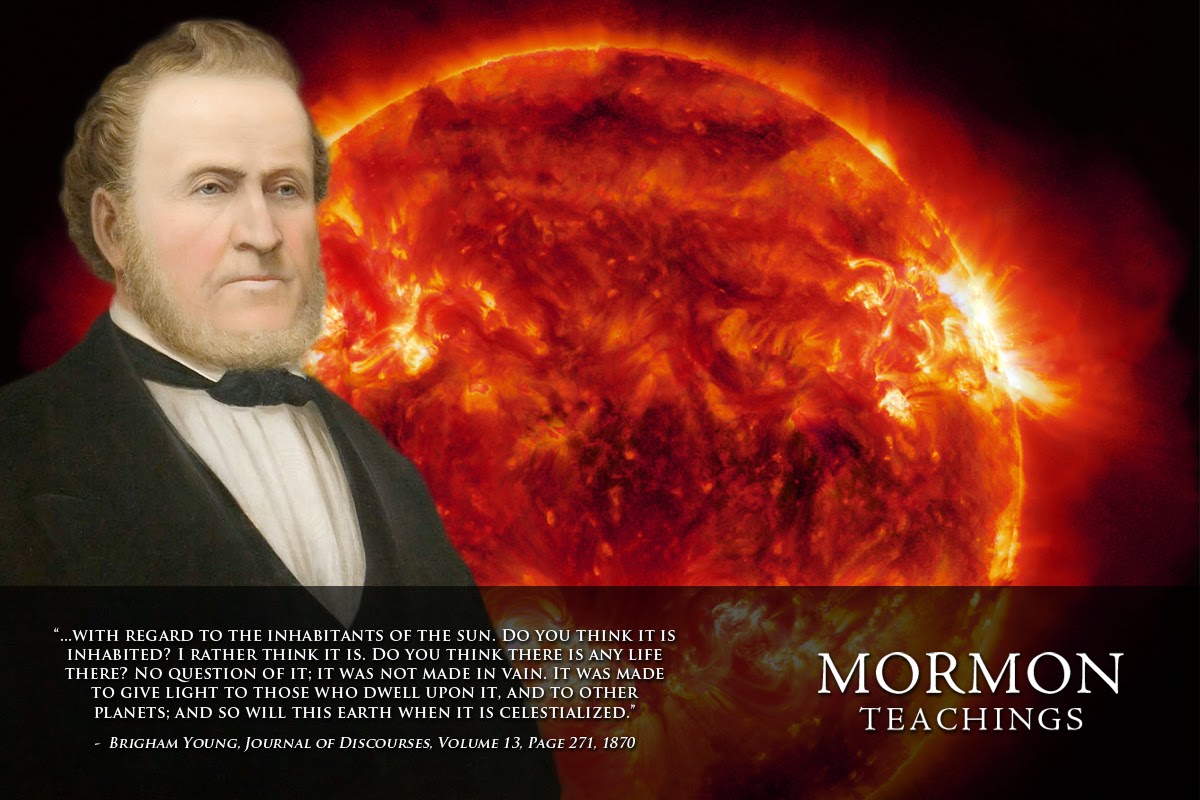“I Will Tell You in Your Mind and in Your Heart, by the Holy Ghost”
Reading assignment
Doctrine and Covenants 6; 8; 9; 11.
Links: Teacher’s manual | Student manual
It’s a busy year for Your Humble Godless Doctrine teacher. So I’m posting this lesson as kind of a rough outline, with the intention of filling in the details later. Think of this as the notes that a Gospel Doctrine teacher would walk into class with.
Overview
We’re continuing our discussion of personal revelation from Lesson 5, in which we saw that relying on feel-good intuitive methods for finding truth or making decisions is just asking to be fooled. This time, we’ll see the mechanisms the church employs to keep you fooled even when personal revelation fails.
Reading
Let’s start with a scripture.
D&C 109:44 But thy word must be fulfilled. Help thy servants to say, with thy grace assisting them: Thy will be done, O Lord, and not ours.
The manual asks:
Why should we submit our will to God’s will when we seek personal revelation?
Answer: Because there’s no one answering. That means you have to generate the feels yourself, and when you can’t, you have to tell yourself that your lack of an answer is “God’s will”. Sucks, doesn’t it?
It works like this:

Ask: If it’s very likely that nothing will happen when someone prays, how can you fool them into thinking something did happen?
Here are two answers:
Tamp down expectations
Tell people it shouldn’t be a big showy feeling. It can be a tiny quiet feeling. (Or, as we’ve seen, it can be no feeling.)
D&C 85:6 Yea, thus saith the still small voice, which whispereth through and pierceth all things, and often times it maketh my bones to quake while it maketh manifest,
From the manual:
Why is it important to understand this principle of how the Holy Ghost communicates? What are the dangers of expecting divine communication to come in more dramatic or spectacular ways?
Elder Dallin H. Oaks cautioned:“Some [people] have looked exclusively for the great manifestations that are recorded in the scriptures and have failed to recognize the still, small voice that is given to them. … We need to know that the Lord rarely speaks loudly. His messages almost always come in a whisper. …
“Not understanding these principles of revelation, some people postpone acknowledging their testimony until they have experienced a miraculous event. They fail to realize that with most people … gaining a testimony is not an event but a process” (Ensign, Mar. 1997, 11–12, 14).
Describe it as confusingly as possible
Dallin Oaks admits he’s never felt a “burning in the bosom”.
Elder Dallin H. Oaks said: “I have met persons who told me they have never had a witness from the Holy Ghost because they have never felt their bosom ‘burn within’ them. What does a ‘burning in the bosom’ mean? Does it need to be a feeling of caloric heat, like the burning produced by combustion? If that is the meaning, I have never had a burning in the bosom. Surely, the word ‘burning’ in this scripture signifies a feeling of comfort and serenity” (Ensign,Mar. 1997, 13).
Right, because burning means serenity, and a horse is a tapir, and my dog is a cat. And words don’t “mean things”. Surely.
Then the manual asks:
How can we discern whether a revelation has come from God? (See D&C 11:12–14; 50:23–24.)
That’s a great question with a disturbing answer. Because Mormon Doctrine keeps changing, we have to keep throwing old prophets under the bus. (It’s getting crowded under there.)
For example, Brigham Young taught racist things
odd things
and terrible things.
Nowadays, these things make church members feel uncomfortable, so under the bus goes Brother Brigham! Those teachings are deprecated.
Not a problem for Latter-day Saints, who remind us that the word of a living prophet is worth more than a dead one.
All well and good. But think: at some point Brigham believed something that was wrong. And as the Lord’s unique representative on earth, he had all the keys of revelation that anyone had. So if he couldn’t tell that he was wrong, what chance do the rest of us have?
“As a man”
A common dodge is: He spoke “as a man”.
Ask: Is there a way to tell in advance if a prophet is speaking as a man or not?
About Oliver
I mentioned that Brigham was a bit of a racist, but as for Oliver, he wasn’t too woke on the subject of race either.
… Let the blacks of the south be free, and our community is overrun with paupers, and a reckless mass of human beings, uncultivated, untaught and unaccustomed to provide for themselves the necessaries of life—endangering the chastity of every female who might by chance be found in our streets—our prisons filled with convicts, and the hangman wearied with executing the functions of his office! This must unavoidably be the case, every rational man must admit, who has ever travelled in the slave states, or we must open our houses, unfold our arms, and bid these degraded and degrading sons of Canaan, a hearty welcome and a free admittance to all we possess! A society of this nature, to us, is so intolerably degrading, that the bare reflection causes our feeling to recoil, and our hearts to revolt….
That’s the kind of thing a regular guy might have said in the 1830s, but hey — Oliver had the Big Guy writing him sections of the D&C. God could have told him to knock it off, and apparently didn’t.
Even though Oliver was rubbish at revelation using a dowsing rod, we can be thankful to him for one of the more fanciful stories in early church lore: when he and Joseph Smith were walking around the Hill Cumorah, the hill opened up, revealing a cave of wonders.
‘Oliver [Cowdery] says that when Joseph and Oliver went there, the hill opened and they walked into a cave, in which there was a large and spacious room. He says he did not think, at the time, whether they had the light of the sun or artificial light; but that it was just as light as day. They laid the plates on a table; it was a large table that stood in the room. Under this table there was a pile of plates as much as two feet high and there were altogether in this room more plates than probably many wagon-loads; they were piled up in the corners and along the walls. The first time they went there the sword of Laban hung upon the wall; but when they went again it had been taken down and laid upon the table across the gold plates.’
Persistent exploration of the hill has revealed no such trove.
However, we can be grateful to Oliver for publishing his ideas on the where Moroni buried the plates (right in New York), and who the Lamanites are (Native Americans). As these ideas look less and less plausible, and as gas-lighting LDS apologists try to distance themselves from them by concocting other explanations, it’s nice to know that people close to Joseph Smith really did think what I (at least) was taught in church.
By turning to the 529th and 530th pages of the book of Mormon you will read Mormon’s account of the last great struggle of his people, as they were encamped round this hill Cumorah. (it is printed Camorah, which is an error.) In this vally fell the remaining strength and pride of a once powerful people, the Nephites—once so highly favored of the Lord, but at that time in darkness, doomed to suffer extermination by the hand of their barbarous and uncivilized brethren. From the top of this hill, Mormon, with a few others, after the battle, gazed with horror upon the mangled remains of those who, the day before, were filled with anxiety, hope or doubt. A few had fled to the South, who were hunted down by the victorious party, and all who would not deny the Saviour and his religion, were put to death. Mormon himself, according to the record of his son Moroni, was also slain.
…
The Nephites who were once enlightened, had fallen from a more elevated standing as to favour and privilege before the Lord in consequence of the righteousness of their fathers, and now falling below, for such was actually the case, were suffered to be overcome, and the land was left to the possession of the red men, who were without inteligence, only in the affairs of their wars; and having no records, only preserving their history by tradition from father to son, lost the account of their true origin, and wandered from river to river, from hill to hill, from mountain to mountain, and from sea to sea, till the land was again peopled, in a measure, by a rude, wild, revengful, warlike and barbarous race.— Such are our indians.



Recent Comments